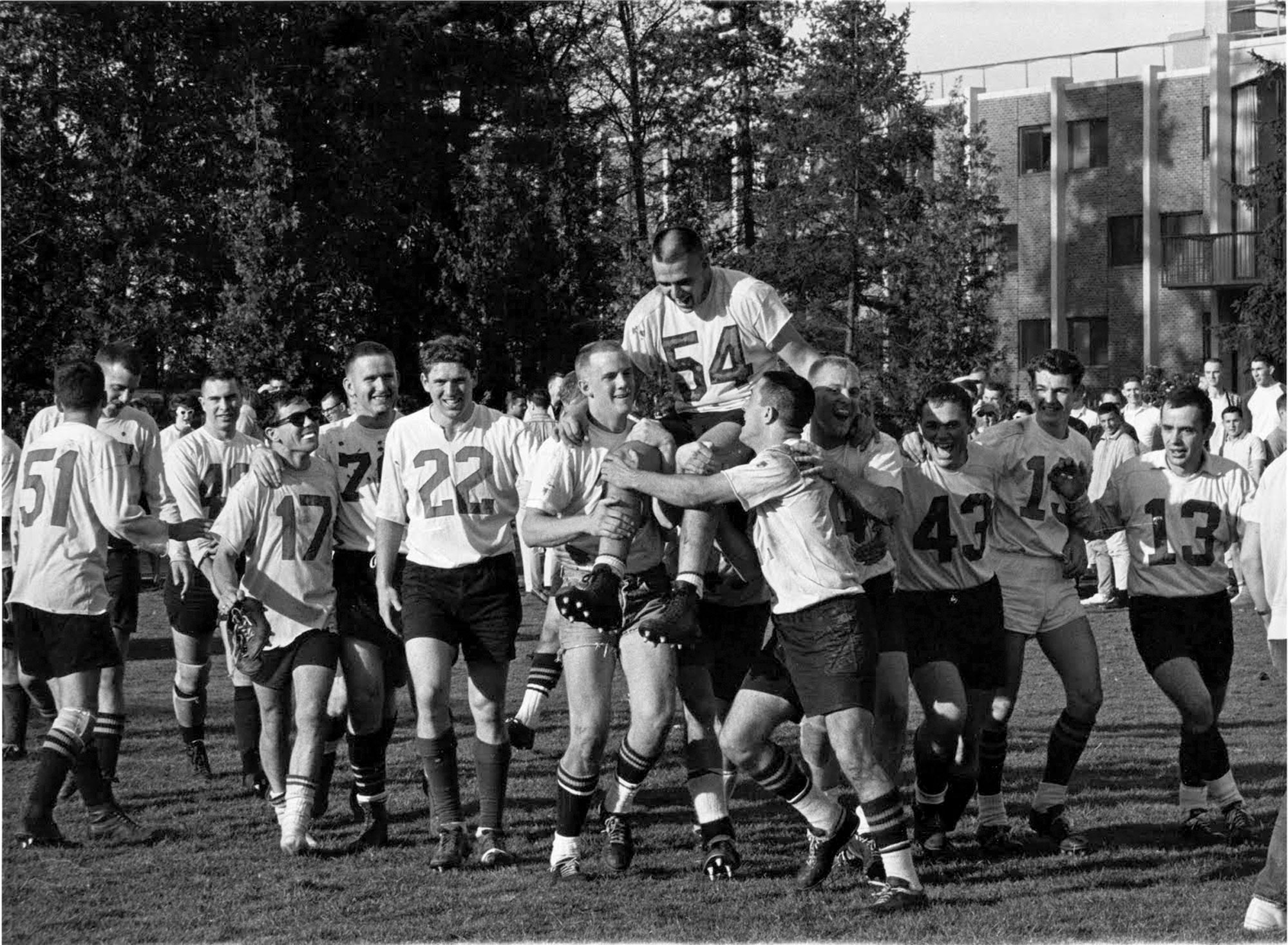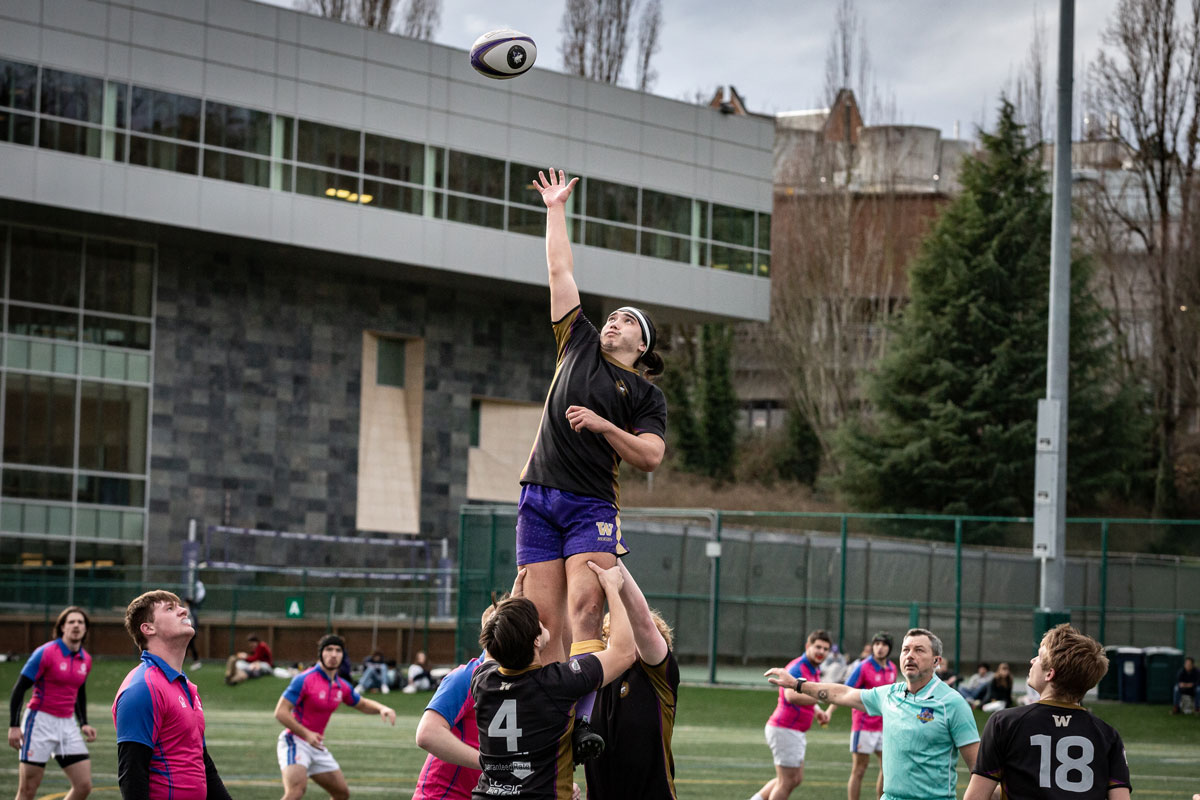

After thriving as a running back on his high school football team in the Bay Area, Brian Cain Jr. had designs on walking on at the University of Washington. He had an in with one of Jimmy Lake’s assistants, but when Coach Lake was shown the door, that evaporated.
So Cain tried his hand at rugby and eventually fell in love with “the intricacies of it,” says the senior-to-be, a political science and economics major who’s now co-captain of UW’s rugby team and plans to attend law school.
Unbeknownst to Cain, he was following the same well-trod path to the sport that Chris Majer took when he enrolled at UW in the fall of 1969.
“I was a marginal high school football player, walked on with the Huskies,” recalls Majer. “That lasted about two hours. I had some issues with authority and this was still Jim Owens football. My athletic career’s over? Wait a minute. I was fortunate in that a guy in my fraternity house (Sigma Alpha Epsilon) started telling me about this sport (rugby) I’d never heard of. He took me out to a practice and I fell in love with it, and four years later I was captain of the team.”

Founded in 1963, the UW Rugby club is the oldest club on campus. The Huskies, who play in the Northwest Collegiate Rugby Conference, won Northwest titles in 1996, 2002, 2004 and 2005 and the 2014 D1AA Varsity Cup.
No foe of the sport, which can best be described as a mashup of soccer and football where punts score points and the action rarely halts, Owens donated surplus football uniforms to UW’s rugby team when it got its start as a club sport in 1963. It’s still a club sport, with the Huskies competing against the likes of Oregon, Washington State, Oregon State, Boise State, and Western Washington in the Division 1AA Northwest Collegiate Rugby Conference.
“It’s gone through peaks and valleys,” says Majer, who’s one of the club’s alumni board members. “To be blunt about it, we’re coming out of a bit of a valley right now.”
Not long ago, Majer asked one of the team’s coaches what sort of challenges they faced. According to Majer, the coach replied, “You old guys don’t understand. The UW isn’t the same. You guys got in with marginal grade point averages. Those guys don’t go to school here anymore. You have to have a 3.8, 3.9 [in high school], so we don’t have a lot of guys-who-didn’t-make-the-football-team type of players.
“The game has gotten really popular high school-wise. We lose the top players because either they can’t get into the U or they can’t afford it. We’re looking for the ones who can at least get in academically.”
Yet based on an encouraging mid-June event at the IMA, the club might be poised to reach new heights — due in no small part to the efforts of alumni like Majer.
Rugby has its origins on the other side of the Atlantic. As Majer explains it, “Rugby was the game of the upper class in England. Soccer was the working class. Soccer was the first sport, and legend has it that one day a frustrated soccer player picked up the ball and ran with it, and the guys jumped on him and said, ‘Hey, that was kind of fun.’”
Majer says that rugby’s World Cup is second only to soccer’s in terms of international popularity. The United States is set to host rugby’s World Cup in 2031, but despite growing interest at the junior level, the host country will likely enter the tournament as a serious underdog. That’s because, as Majer explains, athletes who would gravitate toward rugby in much of the world instead concentrate on American football in the States.
“We poster, we table, we approach people in the gym. Every avenue is open for recruiting, but we haven't found the right recipe yet to find the athletes that we want.”
Will Wheaton
UW’s head coach, Will Wheaton, grew up in British Columbia at a time when rugby was mandatory for boys at his high school. He wound up playing collegiately at the University of Victoria before transferring to Western Washington, which has long had an outstanding program.
Wheaton, who occasionally gets mistaken for the Stand By Me and Star Trek actor of the same name, coached at Western for a couple of years in his early 20s before moving to Seattle. He didn’t come for the UW job; the UW job came to him.
“It’s sort of tacked on to my 9-to-5,” says Wheaton, who’s an architect. “UW was in a really bad spot. They were coachless for a year.”
A low point came when seven players showed up for a game — not the seven-a-side version, but the full 15-a-side contest. In Wheaton’s first year as head coach, the team played only B-side (akin to junior varsity) games. But by the following year, the club had grown to 50 players and was fielding competitive teams at all levels.
“Two weeks before COVID shut us down, we went up to Western and lost 15-17, and they had beaten us by 80 or 90 points a year before,” says Wheaton.
COVID, however, proved detrimental to the club’s growth. Prior to the pandemic, the Huskies had five international students on the team. Since COVID, they’ve had about one a year.
“We’re primarily finding kids on campus and teaching them how to play rugby,” says Wheaton. “We poster, we table, we approach people in the gym. Every avenue is open for recruiting, but we haven’t found the right recipe yet to find the athletes that we want.”
The Husky Rugby Club’s recruiting cookbook may still be in draft form, but over the past year, says Wheaton, a big group of alumni stepped up to raise a healthy amount of money for partial scholarships.
Two of these scholarships were awarded to members of the Rainier Highlanders Rugby Club in Auburn. Both athletes are Pacific Islanders with families steeped in the sport; O’Dea grad Xavier Moimoi’s grandfather played for the Tongan national team in the 1970s, while Jsame Fola attended Federal Way High School.
“The game of rugby is the premier contact sport everywhere else on the planet. It’s particularly popular on the Pacific Islands,” says Majer. “One of the mothers asked, ‘Are you gonna have a signing ceremony like they do for football players?’ Hadn’t thought of that one, but hell yes we are!”
That signing ceremony took place in a room at the IMA on June 10, in a room packed with members of the boys’ families. The club plays its home games on a field adjacent to the IMA facility, where the alumni presence has been both steady and supportive.
“The history is rich,” says Cain. “There are probably more alumni that I realize who come to the games. Rugby was how they made some of their best friends, got some of their anger and energy out.”